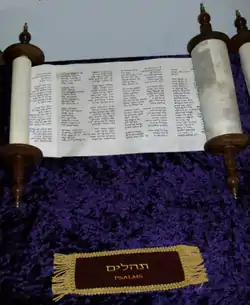Psalm 114
Psalm 114 is the 114th psalm of the Book of Psalms. In the slightly different numbering system used in the Greek Septuagint version of the bible and in the Latin Vulgate, this psalm is Psalm 113.[1]
| Psalm 114 | |
|---|---|
 Scroll of the Psalms. | |
| Book | Book of Psalms |
| Hebrew Bible part | Ketuvim |
| Order in the Hebrew part | 1 |
| Category | Sifrei Emet |
| Christian Bible part | Old Testament |
| Order in the Christian part | 19 |
Structure and theme
At eight verses, this psalm is comparatively concise. It is composed of four stanzas of two lines, which the word Jacob envelops. The two central stanzas evoke with images full of life the miracle of the Red Sea and the passage of the Jordan. God is evoked only at the end of the Psalm, doubtless to arouse the expectation.
Psalm 114 begins with the Hebrew 'בְּצֵאת יִשְׂרָאֵל, מִמִּצְרָיִם; בֵּית יַעֲקֹב, מֵעַם לֹעֵז'. It is one of the so-called Egyptian Hallel prayers, although it is sometimes ascribed to King David.
Verses 1-2

- 1When Israel went out of Egypt,
- The house of Jacob from a people of strange language,
- 2Judah became His sanctuary,
- And Israel His dominion.[2]
This first stanza recalls that the Hebrew people are born in the exodus from Egypt. The words "sanctuary" and "dominion" ("domain" in the New Catholic Bible) designate the entire Holy Land, the inheritance of God, not only in the geographical sense but also in a spiritual sense. The miracles that allow Israel to cross the Red Sea and cross the Jordan River are poetically enhanced by the process of hyperbole and by images evoking a life of natural elements, water and mountains. It is a means of manifesting all creation with Israel and actively participating in its march towards the Promised Land.
Uses
Judaism

Christianity
Since the sixth century, the psalm has been used as a reading at Christian burial services, and also in ministry to those who are dying.[5] It has also been read at Easter Day services, as Israel's deliverance from slavery is seen as a metaphor for deliverance from sin.[6]
Protestant Christianity
In the Revised Common Lectionary, the Psalm appears in Year A on the seventeenth Sunday after Pentecost.[7]
Orthodox Christianity
In Slavic and Greek Orthodox churches, it is sung as an antiphon for the feast of Theophany,[8] for the following Sunday[9] and for Palm Sunday.[10]
Catholic
St. Benedict of Nursia chose this psalm as one of the psalms sung for the offices of Vespers. Since the early Middle Ages, Psalm 114 has been performed at the office of Vespers on Monday, according to the Rule of St. Benedict (AD 530).[11][12]
In the Liturgy of the Hours today, the first part of Psalm 114 is sung or recited on Vespers Sunday. It is the only psalm traditionally chanted using Tonus peregrinus.
Book of Common Prayer
In the Church of England's Book of Common Prayer, this psalm is appointed to be read on the evening of the twenty-third day of the month,[13] as well as at Evensong on Easter Day.[14]
Literature
- John Milton wrote "A Paraphrase on Psalm 114" among his poems of 1645.[15]
- Part of the psalm is quoted at the beginning of Dante's Purgatorio.[16]
Music
Jean-Joseph Cassanéa de Mondonville, grand motet In exitu Israel (1755)
Antonio Vivaldi, motet In exitu Israel 113 RV 604
Jan Dismas Zelenka, two settings, ZWV 83 and ZWV 84, both scored for SATB soloists, chorus (SATB), two oboes, strings and continuo (1725 and 1728)
References
- Citations
- The Oxford Encyclopedia of the Books of the Bible. Oxford University Press. 2011. p. 194. ISBN 978-0-19-537737-8.
- Psalm 114:1-2: New King James Version
- The Complete Artscroll Siddur, page 633
- The Artscroll Tehillim, page 329
- Phillips 2001, p. 224-225.
- Phillips 2001, p. 225.
- Harn & Strawn 2009, p. 297.
- Psalm Verses of the Orthodox Liturgy 2000, p. 62.
- Psalm Verses of the Orthodox Liturgy 2000, p. 66.
- Psalm Verses of the Orthodox Liturgy 2000, p. 103.
- Règle de saint Benoît, (traduction par Prosper Guéranger, Abbaye Saint-Pierre de Solesmes, réimpression 2007) p47.
- Psautier latin-français du bréviaire monastique, 1938/2003 p493.
- Church of England, Book of Common Prayer: The Psalter as printed by John Baskerville in 1762, pp. 284-285
- "The Book of Common Prayer: Proper Psalms On Certain Days" (PDF). The Church of England. p. 6. Retrieved 19 April 2023.
- Milton, John (2003). Orgel, Stephen; Goldberg, Jonathan (eds.). The Major Works. Oxford world's classics (illustrated, reprint ed.). Oxford University Press. pp. 10–11. ISBN 978-0192804099.
- Hamlin 2004, p. 108-109.
- Bibliography
- Hamlin, Hannibal (2004). Psalm Culture and Early Modern English Literature. Cambridge University Press. ISBN 978-0-521-83270-0.
- Harn, Roger E. Van; Strawn, Brent A. (2009). Psalms for Preaching and Worship: A Lectionary Commentary. Wm. B. Eerdmans Publishing. ISBN 978-0-8028-6321-8.
- Phillips, John (2001). Exploring Psalms: An Expository Commentary. Kregel Academic. ISBN 978-0-8254-3493-8.
- Psalm Verses of the Orthodox Liturgy: According to the Greek and Slav Usages. St Vladimir's Seminary Press. 2000. ISBN 978-1-879038-93-6.